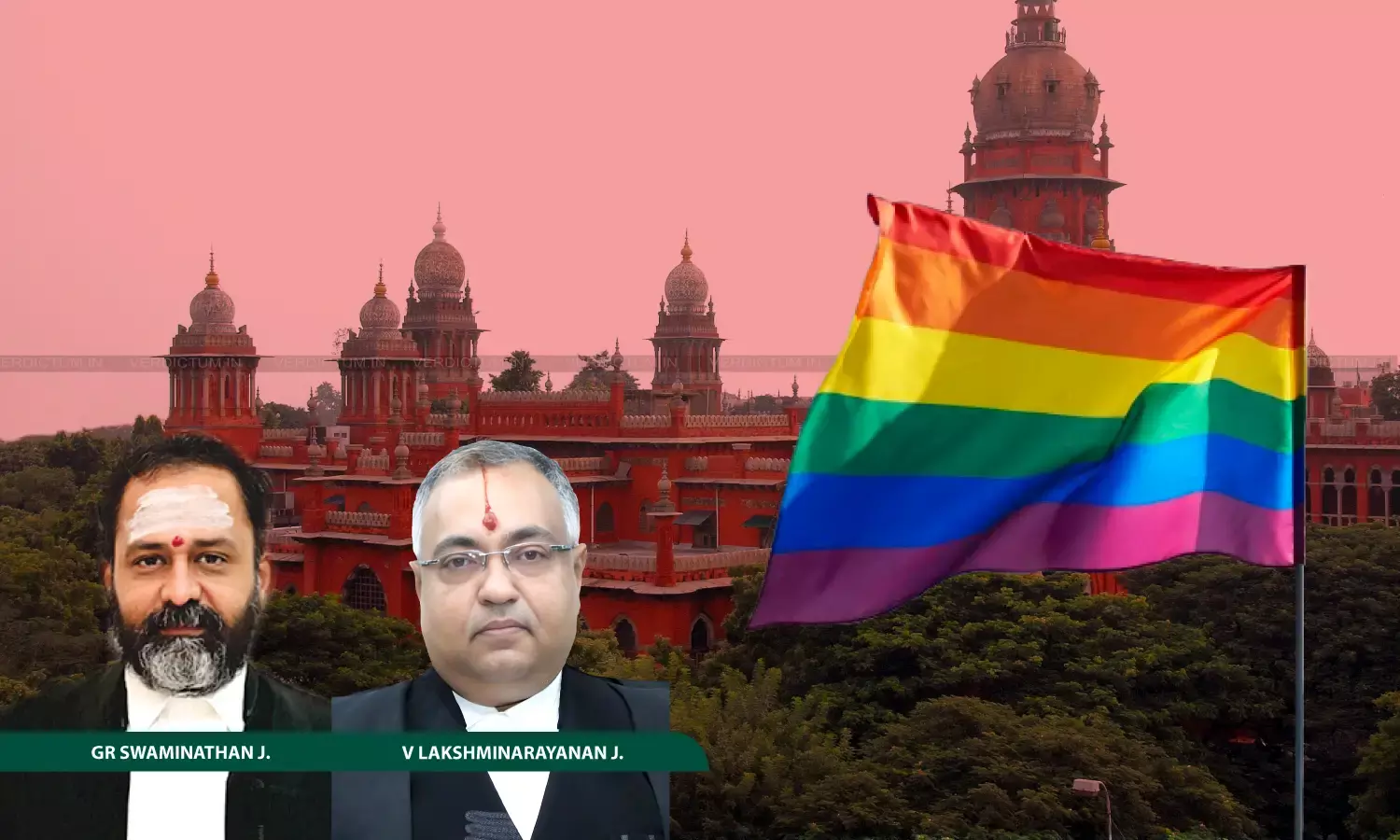Marriage Not Sole Basis To Form Family; Same Sex Couples Can Form A Family: Madras High Court
The petitioner sought the release of her same-sex partner, who was forcibly detained by her natal family for being in a lesbian relationship.

The Madras High Court emphasized that while same-sex marriage is not yet legal in India, individuals belonging to the LGBTQIA+ community are still entitled to form families.
The Court made these observations while adjudicating a habeas corpus petition filed by a woman seeking the release of her same-sex partner, who had been forcibly detained by her natal family.
A Division Bench of Justice GR Swaminathan and Justice V Lakshminarayanan referred to the recent Supreme Court ruling in Supriyo@ Supriya Chakraborty v. Union of India. They acknowledged that, "While Supriyo @ Supriya Chakraborty Vs Union of India (2023 INSC 920)may not have legalised marriage between same sex couples, they can very well form a family. Marriage is not the sole mode to found a family. The concept of 'chosen family' is now well settled and acknowledged in LGBTQIA+ jurisprudence."
The Court also referred to earlier observations by Justice N Anand Venkatesh, a single judge of the Madras High Court, who had advocated for recognizing civil unions between LGBTQIA+ partners a sentiment echoed by the Division Bench in this ruling.
Advocate MA Mumtaj Surya appeared on behalf of the petitioner, while Additional Public Prosecutor E Raj Thilak appeared for the Respondent.
Background
The petitioner approached the High Court after her partner (referred to as the detenue) was allegedly taken away and confined by her family against her will. The local police, rather than assisting the couple, reportedly coerced the detenue into going with her parents, who were then said to have subjected her to physical abuse and so-called “corrective” rituals aimed at altering her sexual orientation.
The detenue's mother alleged that her daughter was addicted to drugs and had been manipulated by the petitioner. However, during an interaction with the detenue in court, the Bench dismissed these claims, noting that the detenue was of sound mind and unequivocally expressed her desire to be with the petitioner. She confirmed that she had been detained involuntarily and subjected to abuse.
Observation
The Court noted, “The detenue is aged about 25 years. She is well qualified. She appeared to be a perfectly normal looking young woman. It would be unfair to accuse her of any kind of addiction. To a specific question from us, the detenue replied that she is a lesbian and in relationship with the writ petitioner. She made it clear that she wants to go with the petitioner. She confirmed the allegation that she is being detained against her will by her natal family. It appeared that she was forcibly taken to her home and beaten.”
The Court put forward the Yogyakarta principles on the application of International Human Rights Law in relation to Sexual Orientation and Gender Identity, drafted and adopted in the year 2006.
The Court drew a comparison with Justice Leila Seth, the late judge of the Delhi High Court and the first woman Chief Justice of a State High Court, who had publicly supported her son, acclaimed author Vikram Seth, upon his coming out as gay. The Bench contrasted this with the conduct of the detenue’s mother, stating, “The mother of the detenue is no Leila Seth. We could understand her feelings and temperament. She wants her daughter to be like any other normal, heterosexual woman, get married and settle down in life. We endeavoured in vain to impress upon her that her daughter, being an adult, is entitled to choose a life of her own.”
They lamented that Justice Seth did not live to witness the landmark Supreme Court ruling in Navtej Singh Johar v. Union of India, which decriminalised homosexuality in India by reading down Section 377 of the Indian Penal Code.
The Bench underscored that sexual orientation forms a core component of an individual’s identity, and is protected under Article 21 of the Constitution, which guarantees the right to life and personal liberty.
The Court also reflected on the terminology commonly used for LGBTQ+ individuals. They expressed discomfort with the term “queer,” pointing out that conventional dictionary definitions of the word include meanings such as “strange” or “odd.”
Judgment
The High Court ruled in favor of the petitioner, holding that the detenue has the full right to cohabit with her partner and cannot be detained by her family. The Court said, “We censure the rank inaction on the part of the Police and the insensitivity shown by them. The Yogyakarta Principles affirm the right to security of the person concerned. When there is a right, there has to be a correlative duty. We hold that the Government officials, in particular the jurisdictional Police, have a duty to expeditiously and appropriately respond whenever complaints of this nature are received from the members of the LGBTQIA+ community.”
To ensure continued protection, the Court added, “We also restrain the detenue's natal family members from interfering with her personal liberty. We issue a writ of continuing mandamus to the jurisdictional Police to afford adequate protection to the detenue as well as the petitioner as and when required.”
Cause Title: M.A. v. Superintendent of Police & Ors.


